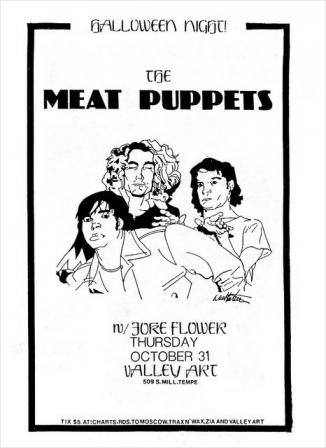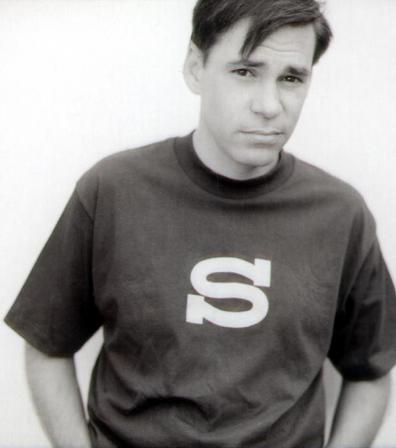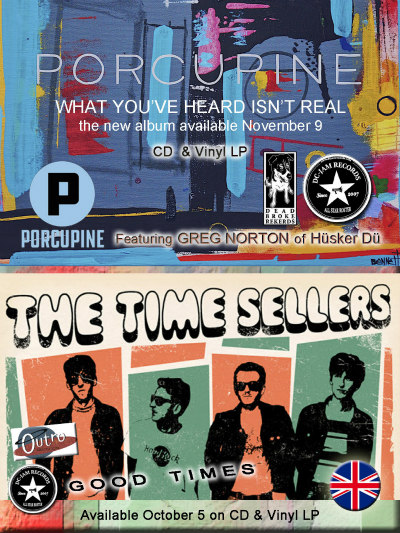Recently, I got the chance to speak with Derrick Bostrom co-founder and drummer of The Meat Puppets. In the interview, Derrick tells us about punk-rock scene in Phoenix and his musical roots, about working in the IT sphere and "Dusty Notes", about "Too Hight To Die" and future plans. Hope you'd enjoy!

Punk Globe: This year Meat Puppets released your new album “Dusty Notes” so let me ask you – in what way your approaches for recording changed after all these years?
Derrick: I’ve got a lot more mature. I went back to work after money ran out. So I learnt how to actually apply myself. The band started in 1980. We did it for living for 15 years. And I never did any other work. So I’d say my life was pretty soft. Once I got back to work, I learnt how to make damn sure that I made a good job – no excuses and all that stuff. I got a feel that developing the strong work ethic probably helps me the most. Not just in terms of committing and doing good work. But also knowing how to do good work. How to focus my energy, be productive, know what success looks like etc. And also, going back to work I encountered SO MANY people. And so many different people. Not just teaching me how to deal with people, but also meeting people who love the band - who were outside of my sphere. And I came to realize how valuable the band was. So when I got the opportunity to reconnect with Kirkwoods after 20 years – I was ready to really grab a hold and make a best of it. And it’s been a real joy ever since.
Punk Globe: How did it feel for you to get back together on stage?
Derrick: It’s fantastic ( laughs)! I’ve done so much more listening to music – my sense of music has grown so much. That it was actually very easy for me, to step right in, reclaim my old songs. Despite the other drummers who’ve have done it, I’ve always considered my interpretation to be the correct one. So I was glad to come in and re-interpret the songs the way I heard them. And that’s been really satisfying. Plus the band –now it’s a five-piece instead of three-piece. We have more to work with. So we’re able to do more improvisation. Also, doing different kinds of songs. We have more control on our dynamics. And that’s been very satisfying. Working in a three-piece is fun, but working with a five-piece has been a lot more musically rewarding.
Punk Globe: When you first met Curt and Cris you got the idea of playing punk rock…How did you discover punk-rock itself?
Derrick: Well, I probably first heard of it by reading Creem magazine, which was a really popular rock-n-roll-oriented magazine. They were covering what was going on. And I didn’t pay much attention to that, but then, the local radio station started covering some of the local bands here in town. There were about three to six punk-bands in Phoenix in 1977-1978. At that time, I was too young to get into bars. So I reached out to the band members directly and got to know them that way. Also, I started to hear some of interviews with Johnny Rotten who really impressed me as a sharp character and somebody who I really liked. I grew up as a hippie. And by 1977 we were still smoking a lot of grass, taking a lot of acid, listening to a lot of prog-rock. But I really appreciated some of the things I’d heard Johnny Rotten said. It made me think that punk-rock had the old anti-establishment counterculture spirit, which was kind of lost despite of continuing drug-usage and listening to rock-n-roll and FM radio. Punk-rock affected me as something that kind of returned to the first principles which mattered to me as a teenager. And still matters to me. So what attracted to me with punk-rock – the energy of music, the passion it made me wanna start playing drums.
Punk Globe: Looking back on that era of your career I can’t but notice the impressive style of your drum technique. Even with such not-so-typical songs for Meat Puppets like “Teenagers” it sounds just amazing. Who were the drummers or other kinds of musicians that inspired you at that point ?
Derrick: Obviously, I didn’t have a tone of drum-influences…The real reason I got into drums was that I had a friend who had electric guitar. I figured if I had drums we could jam. But there was a local drummer who was in most of punk-bands. He also played the guitar in some of them…Cause, the bands in town were kind of “rotating group” of the same scenesters and musicians. There was one fellow namely John Precious, who really influenced me. Along with his other friend – Dale Smith, who also played the drums. And then Don Bolles, who went on to play drums for The Germs. I’d say that those three guys were my punk-rock touchstones when I first started playing. Obviously, I heard some of the records. But seeing those guys actually play in person probably had the biggest impact on me.
Punk Globe: You have always said that among all the records of Meat Puppets, the sound of your drums at Meat Puppets II is probably your favorite – what made it so special for you?
Derrick: Honestly, the reason it’s my favorite and I can hardly tell you why – it’s so special. That’s was makes it so special. It’s magical! Obviously, I came in getting into music as punk-rocker. And as we had kind of matured, Meat Puppets II was a record we did during our fourth year of existence. Curt wanted to take a band into another direction. And once we got into the studio, and bottled that – it was really something. Obviously, the first record is pretty noisy. We went to trying to make much cleaner-sounding record. We were really impressed with results. We had really nice results. Some of the songs really knocked me out. A lot of time you won’t really know what Curt’s lyrics are going to me. Cause he’s still kind of working on it in the studio. So when I heard the final project – that was just blowing away!
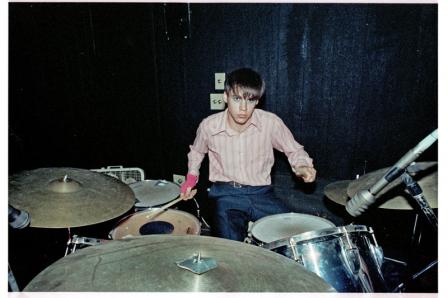
Punk Globe: Even though you were signed on SST which was basically a label associated with punk and hardcore music, I may say that during the 80’s your sound passed through a series of changes. Listening to your second album and “Up On The Sun” we could hear it. What helped you to form your classic sound?
Derrick: Well, obviously you mentioned that SST is kind of punk-rock label. One of the things that helped us forming our sound was going out and playing with Black Flag. And finding that their crowd…Even when we played really fast punk-rock we still kind of look like hippies. We found that the crowds cared more about our look than our sound. And we were kind of grossed out by the skinhead-hardcore-scene. So we never really had a strong allegiance to it at the first place. We were like “Screw It! We’re going to play the kind of music we grew up with!”. As I started getting away from punk-rock I started listening to older things…Elvis was big influence around that time. Elvis and other 50’s artists were important. Obviously – Ringo, Charlie Watts and Keith Moon. Those guys were important influences. ‘Cause, I always like the old-time-rock-n-roll and the 60’s stuff. I still love bands like Yes and drummers like Bill Bruford and Jaki Liebezeit from Can. But their influences were a little less direct because I was never kind of drummer who wants to become a drum-geek, who sits and particularly learns those chops and stuff. My chops are very-very rudimentary and loose, but I consider my style to be very expressive. And it’s been very satisfying to me, what I do. But I’m still very rudimentary old-school rock-n-roll kinda guy.
Punk Globe: But with this, quite often you tried something new and untypical. I mean, if we’d compare your debut album with “Huevos” or “Too High To Die” – they do not sound like three different albums. But three different bands! Was it hard for you to define the direction you wanted to move to?
Derrick: I’d say so! For instance, one of the things you learn when you first get to the studio – you have to play consistently. You have to play loud. You have to play a part that will work in a studio. And when we were doing “Up On The Sun”, when we got into the studio, I discovered that some of the parts I had written for some of the songs didn’t sound the way I heard them in my head. So I threw a tantrum and went to walk around the block for about 20 minutes or so. And came back, rewired my head and my parts so they were simpler. So a lot of the stuff on “Up On The Sun” was a kind of on-the-spot simplification to keep it little bit more direct. On Meat Puppets II, I’m playing very simply but “Up On The Sun” was a little less expressive in a certain way. Because, I was just keeping it on the floor, super simple and direct. That was kind of approach I took from there, through the rest of the 80’s. As Curt began to write more and more different types of material, my role was just keeping drums very simple. A lot of times, Cris and I would get together and work out specific parts, like if he heard something I didn’t hear. But I played much less compositional role…Probably from “Up On The Sun” through “Monsters”. On “Monsters” I started playing more compositionally. By the time, we stopped playing – in 1995 I kind of mastered my style. In terms of what we changed from session to session…We were trying to improve, avoiding the mistakes we did before. If we did one thing, for instance Meat Puppets II we did a serious of sessions. The actual record took 8 months to finish. Because, we were doing a certain amount of experimenting. Curt had never really sung in his natural voice before. That took a little bit longer to get it right. But consequently, it became We’re not gonna rely on SST and their people! We’re gonna book our own studio-time in Phoenix! And schedule our own time!” – Instead of feeling that we have to get in all done in three days, we could take control of the studio ourselves. And then it was just a question…We did some records with , who would direct how the record was gonna sound. The producer would obviously help us pick material, would sit during the rehearsals and all that kind of stuff. Each record has a different approach based on circumstances, what we wanted, what the label wanted, opportunities, what the songs are like. We just never restricted ourselves.
Punk Globe: It’s interesting to speak with you about DIY and your roots. Because, I think you’d agree that in the US, there were many musical tendencies that lately became the basis for alternative rock. And all these bands of the 80’s – whether it’s Meat Puppets or Husker Du, Black Flag or The Replacements, Minutemen or Butthole Surfers – all of you brought something to the melting pot. But did you feel any sort of collectivity back in the days or with the Meat Puppets did you always feel you erre were some sort of outsiders ?
Derrick: We definitely felt like outsiders! And I felt like an outsider within Meat Puppets, sometimes, but that’s another story… I’d definitely say each one of these bands felt like their own outsiders. Some of them like Black Flag were interested in doing business. Others, like The Replacements, seemed to be dedicated to destroying their career through alcohol. We fell somewhere in the middle. We definitely wanted to do this for a job. But we also were uninterested in doing it any other way but our own. Coming back to the band after this long, I’m struck by how important those sacrifices you make for your art are. The Kirkwoods are like absolutely unsuited to do anything but what they’re doing ( laughs ). They’re like Meat Puppets 100%. And they pretty much have devoted their life to this music. On the other hand, I had gone to getting a job, getting married, blah-blah-blah…I’m appreciating rejoining of this music. It’s such a rough joyful experience. That really strikes you. And those kinds of guys who just absolutely dedicated to their music…Especially ones who’re giving a middle finger to the establishment – they’re just tremendous. All of these bands you mentioned were absolutely dedicated to doing it their own day. A lot of it just boils down to energy. How much energy can you bring to it.
Punk Globe: With the release of “Too High To Die” and getting the contract with London\Polygram you got the mass-recognition. With Unplugged, MTV etc. In what way it affected your work, creatively ?
Derrick: The label interferes with creative process a lot. They definitely see your work as a product they need to sell. And they have a bureaucracy – a lot of different people they have to sell you to. So it’s not just the question of selling records to the public. Or selling you to the radio to play your records. You got to convince everybody within the company. So there would be all sorts of different layers who have to decide you’re worth investing in. They definitely think about you as an investment. The hit comes when everybody in the record company on the same page and behind you. And that’s unique! During that period – in the 90’s, a lot of people who grew up listening to this kind of music, began to exercise their passion for that kind of music. And a lot of us benefited. Even Meat Puppets, as weird as we were got swept up in that. The major-label experience is not really conducive to the kind of art we were making. And not only did these these people want to interfere -- they also want you to work to the DEATH! Oh my God!...It’s not different from the way it was always. Back in the 60’s you listened to all these radio-stations. Popular bands have these four or five golden songs you always hear on oldies. But they probably put out a record every two or three months. For everyone you know there were probably 8 you didn’t know. And they constantly pushed these artists like mad. We didn’t want to work that hard. But in 1994 we were on road constantly, travelling constantly and working way more I can ever do now. And kind of took some of the fun out of it!
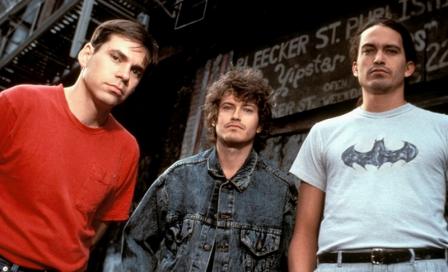
Punk Globe: Don’t you think that with becoming of internet it became easier for you to work these days ? I mean, of course you released your recent album through Megaforce Records…But…
Derrick: We were actually so tired from touring with SST, on a shoestring. That we were like…We had resisted being on a major-label. But we finally: “You know what? We’re gonna kill ourselves on the road if we won’t find some support!” We definitely worked as independent act as long as we could. And, once we got in the major label, their money allowed us to tour a lot more. And they definitely increased our visibility. But here’s something you need to understand. They major label didn’t get us on “Nirvana Unplugged,” We got us on “Nirvana Unplugged,” pretty much all by ourselves. The fact the Kurt Cobain had liked Meat Puppets II and invited us on a road…As luck we’d have it – it was right before they’d go to MTV studio and Curt somehow managed to talk himself onto that show. If that hadn’t happened – “Too High To Die” may not have happened…Most people know us due through “Nirvana Unplugged” and that’s not due to any machinations from the company. That was our own networking and our own records – that was Curt. That was something that happened in spite of major label stuff.
Punk Globe: And if we’d speak in terms of your drumming style during that period – “Too High To Die” and “No Joke!” – because, with all these changes the dynamic of the band started to change as well. So how it’d reflected on your play ?
Derrick: By the time – it was mid 90’s. We’ve been together over a decade. And we knew what we were doing pretty well. One of the things about “Too High To Die” is that after the lack of success of “Forbidden Places,” the label was not gonna put out another record by us unless they had a reasonable assurance that it was gonna do well. We did several demo sessions and working with several producers. Additional producers…The label was not gonna let us to the studio without. And it was, until Paul Leary came on board. Then – they gave us the green light to do the record. But even then, they wanted us to record an EP on one of their subsidiary labels. It wasn’t until Paul and us got into the studio and we were like: “F*ck that! Let’s just record whatever!” and we were lucky that the label liked it! Once they heard the stuff we had done with Paul for this EP they said: “Ok, go ahead and make a record!”. But by the time we were in the studio, making that record – it’s been almost two years of constantly working. Developing songs, developing material, rehearsing, consulting with label and trying to get a package together they liked. And like I said – once they gave us the green light it was all about… there are a lot of people working. It’s a bureaucracy. There are different departments that make up a record label. By the time we find us making a record, everybody was had signed off. So it’s just making a movie! There’s not one person as creative force. As much as our name is on the record and our picture is on the record – that record is result of lots of peoples’ efforts. Ours and Paul’s, and dozens of people who work in the record company and all the people who work for them. But getting back to your question – we worked our asses off to make that record! We did a lot of playing. And worked those songs a lot. By the time we actually got into the studio, we had a pretty good sense of what we were doing. And also, Paul Leary is a dear old friend what we had known forever. We had fun with Pete Anderson who did “Forbidden Places”, but Paul was somebody who we were intimate with. He was one of us! And there was much less nervousness, paranoia or whatever. Because, Paul was our man.
Punk Globe: And also a nice producer!
Derrick: Sweet guy! And he knows electronics very well! He’s a good producer. Obviously, Butthole Surfers were a sonically experimenting band. And that was largely Paul. Having him and his ears behind the board was huge for us. I just wish we could have done more! Because, we were focusing on making commercial records – the records you’d listen on public and buy! So we were pretty straight…”No Joke!” is even straighter! But both of those records are terrific. I wish that our Polygram records were still in print. But unfortunately only “Too High To Die” is available. We are constantly scolded by fans online: “WHY DON’T YOU GUYS MAKE THOSE RECORDS AVAILABLE?!” – And I’m like: “Guess what?! We don’t own them! Talk to the label!” (laughs). Of course, people are basically lazy – they have to stream it. You’d find these records online if you’d look hard enough….But I’m really sorry, ‘cause, I think “Forbidden Places” is one of the best records we’ve made! And you can’t buy it. Punk Globe: If we’d speak in terms of your next album. How do you see it ? Derrick: Well, the last record we made was kind of transitional…They started with Shandon [Sahm] – their last drummer. And basically Curt invited Ron Stabinsky to join, woodshedding some songs he had. So Curt and Ron worked on arranging that stuff. They went to the studio as a five-piece. They got some rough tracks done. And then Shandon decided to move to Europe, and Curt asked me to take his place. I went in and re-recorded the drum-parts. A lot of the stuff was done with mostly Curt and Ron. In the time since we record that album, we’ve played together a lot more. We hadn’t really played together that much as a five-piece, live. We’re hoping that our next record would be much more based on our ability to play together as a unit.
Punk Globe: After you broke up, you focused on your work in the IT-sphere. Can you say that it’s affected the way you look at the things now, as musician and drummer ?
Derrick: I’d say so! If not much on technical standpoint. Because, obviously, I think that technologies more and provides a pretty negative effect on our lives these days. But in terms of learning how to approach a project, how to break things down, how to solve the problem…I do a lot of support in my job – tech support type of things. Understanding what works, what doesn’t. How to tackle a situation, break it down, look at it from different angles. And also, learning how to work without sleep is very helpful on the road. When you work in IT and you’re on call, sometimes you have to get up in the middle of the night and fix a problem. When you’re on the road, sometimes you don’t sleep either. So learning how to work when you’re tired is important. But I think, basically, my work in IT makes me appreciate the simpler things. So the contrast between my day job and the organic pleasure of playing in a band is marked…I like them both! But I’d surprise when I got back into music, after 20 years, how easily and how importantly it fit back into my life.
